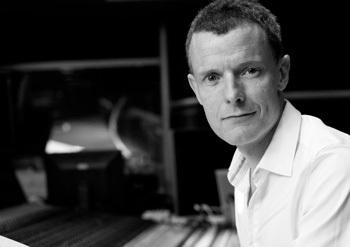
|
«Hans Zimmer and I liked each other a lot and… it worked well» Hi Martin. Thank you very much for talking with us about your score for Woman In Gold, we would love to ask you a few questions about the composition of the score and your collaboration with Hans Zimmer for this project. Yeah, of course, that will be great, my pleasure. Well, fantastic, could you tell us the story behind the creation of the score Woman In Gold and who was the first of you attached to the project at first?, and which were your first steps in your collaboration with Simon Curtis and Hans Zimmer?
As I said, I came on quite late with only a few weeks to get it done, and initially, actually I received the news that Hans was not going to be able to do anything and that I would do it all, because they wanted to release the film last year. Then they decided they didn’t want to put it out last year and wait until 2015 to have more time to get what we needed. With this decision, and having more time, Hans decided to be back on board, and I have to say that it could have been tricky, but he is such a nice guy, and a really generous person, and he is very very good at what he does, as you know, hahaha, you know, he is the best, in many ways. He wrote a bit of material, he came out with one idea, and I took bits of that and I mixed it with my own ideas and we start from there. On the CD we splitted the tracks between us about who wrote which, which track is from Hans or me, etc, finally you know, we were together down the road to get the ideas and compose the score. So talking about the CD released, are your parts of the music indicated, which part of the music is from you or from Hans?
Yes. I recognise his style in that piece. Martin, who composed the farewell scene at the end of the movie, the one with the family goodbyes? That’s all mine, the farewell and end credits part of the movie. That’s my favorite part of the score, I loved that. Thank You!, good, thank you, thank you so much. You’re very welcome!
Great. Which were the indications of the director in this case working with you both? Not Much!, haha. Not much actually, well, you know, Simon (Curtis) does not have a lot of opinions about music, and, when we were with Harvey Weinstein, he did have considerably more opinions than the director did… About the music and about everything I presume about Mr. Weinstein, haha. He is all over the place, right? Hahahaha, yeah. Well, I would like to focus in a couple of cues of the score. You have told me about the chasing scene, which is a work by Hans, and about the ending, the farewell scene, and which is the creator, the composer of the Altmann family theme? The Altmann family theme?, from which bit? The «Maria Altmann» titled cue in the CD.
Wow, I found that scene beautiful, how the music anticipates the moment creating the emotion of the reunion. Oh, thank you very much! Yeah, it is great how you work showing the emotions inside the head of the character of Maria. Very good, thank you. That’s so good to hear, that was my idea. And, was it tricky, when you are collaborating with another composer like Hans in this case, to choose the moments or scenes to compose for?. Which was your first bit of the film to compose for in this case?
And that instant is like the trademark of the movie. Good, good, well, it is nice you feel that way, thanks. My pleasure. I noticed a trademark of Hans’ style in the theme for Randy, did you collaborate in that cue with him?
Wow, amazing to notice all that now! Great!. Happy you like it! To work two different composers, like Hans and you, with such different backgrounds, and to achieve a score like Woman in Gold, so well crafted at every angle to feel the movie, getting the film music critic to forget to be thinking who has composed this or who has composed that, and to sense it as a whole, that’s , that’s an achievement. At the movie, it is excellently well chosen which moments needed to have music, which instants need to define the protagonists with music and when this is not necessary, leaving you waiting for the next scene. So, congratulations to Hans and you for a magnificent job for Woman in Gold. Truly. And now, I would like to ask a final question… Thank you!. Sure, go ahead. I collaborate as you know for the Spanish film music webpage BSOSpirit, and I would love to know for our readers at the page and at the newsfeed section, which are your most anticipated upcoming project or projects at this point if you could tell us? Sure, sure, glad to. Well I am actually doing a TV thing next, War an Peace. War and Peace? Wow, epic! Haha, yes!, you know, a small project, haha, nothing much, haha. It is a BBC and Weinstein collaboration and it is sort of, it should be huge, it has got a big budget, it is really a TV event, it is going out in America simultaneously than in the UK and in Europe, it has the Cinderella star in it and Paul Dano as protagonists, I don’t know if you know them. Yes, of course, Lily James from Kenneth Brannagh’s Cinderella and Paul Dano, the actor from There Will Be Blood, right? Yes! That’s right! And you know the release maybe? Oh yeah, it is planned to be broadcasted in January. Ah, OK,. And you are working right now in the project? I am just started, I travel in fact tonight to Vilnius, in Lithuania. To see the director, and spend some time there inmerse in the atmosphere. They are still filming right now. Who is directing? Tom Harper. Not Tom Hooper, Tom Harper, the director who did Woman in Black sequel recently and the TVshow Peaky Blinders, which I did as well. Ah, yeah, ok, I know now, great show by the way (starring Sam Neill & Cillian Murphy). Thanks, yes, so fingers crossed, you know, it is a big project. Yes, it is great, waiting for the cd release of your work in the upcoming future. Yes, there will be a CD indeed, yes. Fantastic, here we love your works for the BBC like Sense and Sensibility or Oliver Twist, and of course, Brighton Rock, we love Brighton Rock. Thanks, very good, very good, thank you. Well, thank you very much, it has been such a nice conversation, Martin, thanks for the opportunity to talk with you. My pleasure Asier, it’s been great to talk to you, and thanks for showing interest in my work and my music. I look forward to talk again soon. All the best, talk soon, Martin, thanks again, mate. |
Author
BIO: Martin Phipps, born 1 August 1968, is a British and Swedish composer, who has worked on numerous film and television projects in the UK and Europe along the years. Phipps is the son of Sue Pears and Jack Phipps, an arts administrator who had previously founded a management agency, which acted for many leading musical figures (including Benjamin Britten, Martin’s godfather). Phipps enjoyed early critical success with Eureka Street, and went on to score the BBC period dramas like North and South and Elizabeth – The Virgin Queen, for which he was recognised with the Ivor Novello Award for Best Original Score. Phipps scored Low Winter Sun for Channel 4, starring Mark Strong, and Persuasion, the most recent ITV adaptation of Jane Austen’s novel, as well as Grow Your Own and the BBC version of another Jane Austen’s classic, Sense and Sensibility, adapted by Andrew Davies. That brought him the commission of the score for the Charles Dickens’ inmortal novel Oliver Twist for the BBC, for which he was recognised with the Ivor Novello Award 2008 for Best Television Soundtrack. Another ones of Martin’s most notable works through the years were Wallander, starring Kenneth Branagh, for which he was recognised with the BAFTA Craft Award 2009 for Best Original TV Score, the feature film, Endgame, starring William Hurt, Derek Jacobi, Mark Strong, Jonny Lee Miller and Chiwetel Ejiofor, chronicling the breakdown of S. African apartheid, directed by Pete Travis, Small Island, winning the BAFTA Craft Award 2010, Graham Greene’s Brighton Rock (Mike Diver described Phipps’ score as «rich and sumptuous of tone and depth), Harry Brown or the newest BBC adaptation of Great Expectations. More recent credits include the first series of Peaky Blinders on BBC2, starring Sam Neill & Cillian Murphy, for which he was nominated for a BAFTA Craft Award and The Honourable Woman. His documentary work includes scoring the documentary Britain in a Day. More recently he composed the score of the Harvey Weinstein film Woman in Gold in collaboration with Hans Zimmer, and is currently working on the BBC adaptation of War and Peace.
Review |


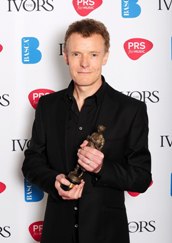 I did come quite late at the film, and I must say, from the very beginning, Harvey Weinstein (the producer) wanted Hans Zimmer to write the score, and he initially said yes. Then it became quite clear that he probably wouldn’t really have the time to do it, and they had a problem with that situation. Meanwhile, the editor of the movie had put my music all over the film (as a temporary score), so the cut of the film at that point had a lot of my music , which they already liked it, so they decided ask Hans to do a little bit, like write a theme or so and put some input, and then get me to do the rest of it, and that’s what kept people happy.
I did come quite late at the film, and I must say, from the very beginning, Harvey Weinstein (the producer) wanted Hans Zimmer to write the score, and he initially said yes. Then it became quite clear that he probably wouldn’t really have the time to do it, and they had a problem with that situation. Meanwhile, the editor of the movie had put my music all over the film (as a temporary score), so the cut of the film at that point had a lot of my music , which they already liked it, so they decided ask Hans to do a little bit, like write a theme or so and put some input, and then get me to do the rest of it, and that’s what kept people happy.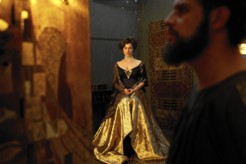 It is. Hans wrote an opening idea, a very simple piano waltz and then he did most of the chase, well you know that part from the film.
It is. Hans wrote an opening idea, a very simple piano waltz and then he did most of the chase, well you know that part from the film.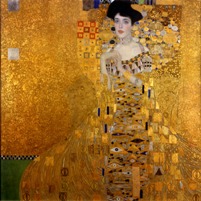 That’s all mine,those were my thematic ideas. I mean, you know, it is sometimes tricky, you know when you collaborate together for the first time and so, but we liked each other a lot and…, it worked well. I would be very happy to do that again with him, I have such respect for him.
That’s all mine,those were my thematic ideas. I mean, you know, it is sometimes tricky, you know when you collaborate together for the first time and so, but we liked each other a lot and…, it worked well. I would be very happy to do that again with him, I have such respect for him.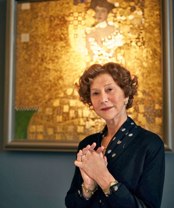 Oh, The Maria Altmann theme. That’s mine, it is how the theme is played at the end credits. That’s the music on the credits, yes, and that comes from the moment at the Belvedere Gallery, and she sees the painting again after so many years, and she reunites again with the painting and the memories at the gallery.
Oh, The Maria Altmann theme. That’s mine, it is how the theme is played at the end credits. That’s the music on the credits, yes, and that comes from the moment at the Belvedere Gallery, and she sees the painting again after so many years, and she reunites again with the painting and the memories at the gallery.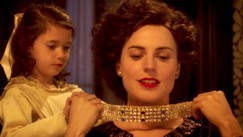 THAT MOMENT!, haha, that precise moment, you pick that one very well!, that’s the cue I wrote first. And then Hans came in and he wrote the opening, that very straight piano waltz opening, and he also developed that for when they arrived in Vienna, and they are driving through Vienna, and out of that too it came the chase music as well. He is very clever, and he took that to evolve into the chase cue. And that’s kind of the episode of his input on it. And then, I had to record and I recorded and mixed all of his cues, and I took his theme and put it in a few other places, adapted it a bit myself or not, or just put it in some places, yes. But for me, my first scene was that at the Belvedere Gallery when she sees the painting, yeah.
THAT MOMENT!, haha, that precise moment, you pick that one very well!, that’s the cue I wrote first. And then Hans came in and he wrote the opening, that very straight piano waltz opening, and he also developed that for when they arrived in Vienna, and they are driving through Vienna, and out of that too it came the chase music as well. He is very clever, and he took that to evolve into the chase cue. And that’s kind of the episode of his input on it. And then, I had to record and I recorded and mixed all of his cues, and I took his theme and put it in a few other places, adapted it a bit myself or not, or just put it in some places, yes. But for me, my first scene was that at the Belvedere Gallery when she sees the painting, yeah. No, not really, no. Actually all the Randy stuff is mine, all his kind of procedure, all the corporate themes, all the things with Randy, when we first met Randy and when he makes his final speech to the tribunal, all is mine, yes. And if you listen to it carefully there is an organic theme in it from The Belvedere Gallery scene that it is as well in the credits and conforms the Maria Altmann theme at the end, so they are sort of linked.
No, not really, no. Actually all the Randy stuff is mine, all his kind of procedure, all the corporate themes, all the things with Randy, when we first met Randy and when he makes his final speech to the tribunal, all is mine, yes. And if you listen to it carefully there is an organic theme in it from The Belvedere Gallery scene that it is as well in the credits and conforms the Maria Altmann theme at the end, so they are sort of linked.

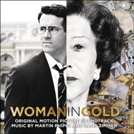

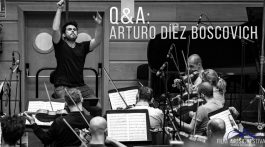
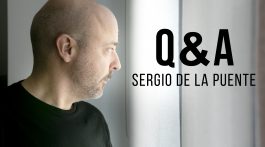
No hay comentarios